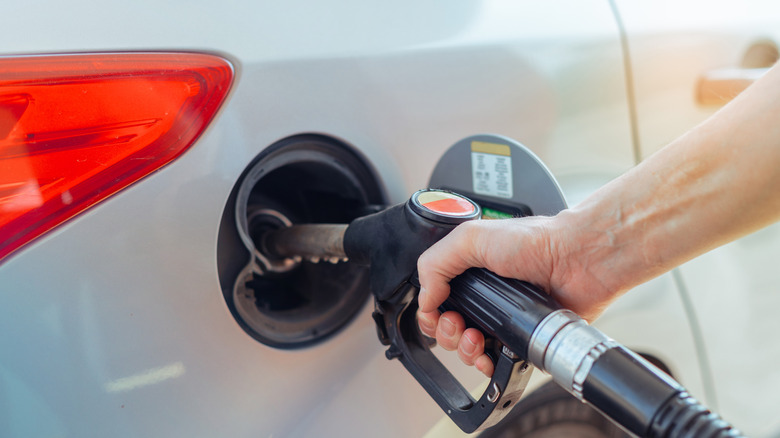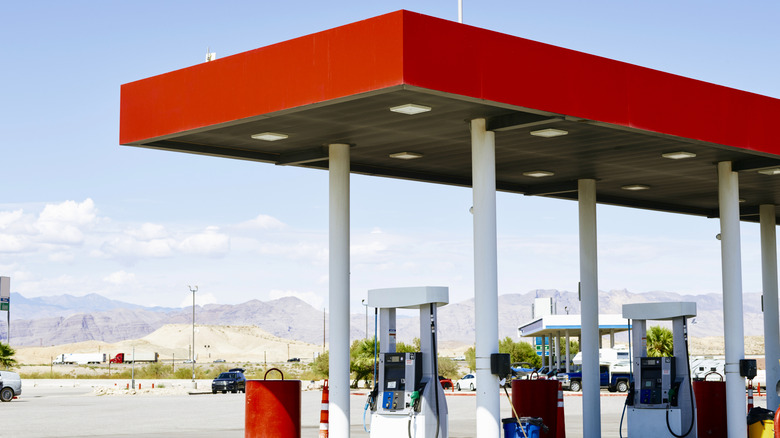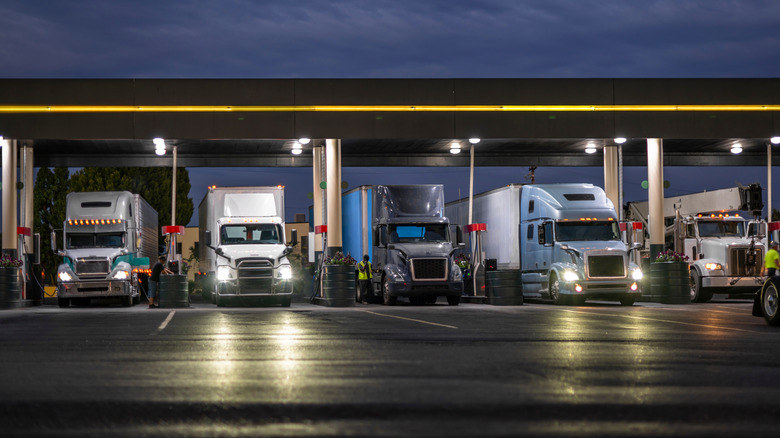This State Has The Highest Gas Prices In The Country (And Here's Why)
It's a widely-known fact, especially among those living close to state lines, that some states have better gas prices than others. Places like Texas, Oklahoma, and Louisiana, for example, enjoy gas prices that make Nevadans and Washingtonians jealous. But what about the absolute highest in the country? It comes as no surprise to the many living there, but that title belongs to California ... at least currently. It seems to be in a battle against Washington State to see who has the most expensive gas, so it fluctuates between the two depending on the week.
As of Sept. 30, 2025, California leads the race with an eye-watering $4.649 per gallon, with Washington State trailing with $4.549, ten cents less. And this isn't a new trend, either. It's actually been a longstanding source of debate, leading to an entire campaign run by "Facts Per Gallon" discussing the issue. That campaign itself cites the reason behind the rising gas prices as an environmental issue, citing banned gas stations, low-carbon fuel requirements, and other factors as being main contributors. But is this the reality of the situation, or is it more nuanced?
The short answer that matters most to consumers is that California boasts the highest taxes on pump gas across the country, not including additional taxes such as local or municipal-level, cap and trade carbon policies, and so on. For California, that means a hefty baseline along with more taxes on top of that. All those factors result in gas prices nearly double that of some states. Additionally, getting the fuel into California is an issue due to a lack of any pipeline. Let's take a closer look at the facts.
What sort of taxes affect gas prices?
The federal gas tax sits at about 18 cents. But each state has its own unique tax, which it then funnels into road construction and maintenance, public access upkeep, and other such projects. This rate changes on a yearly basis, having gone down by about 10 cents since 2022. However, the excise tax rate has steadily crept up every year, reaching $0.612 per gallon in California as of July 1, 2025.
Other taxes tend to vary more at a municipal level, as well as depending on which station you use. Not all gasoline is created equal, nor are the stations, and the entire assembly line from start to finish needs maintenance, plus there are octane ratings and diesel, which is often more expensive. As such, no fewer than nine factors contribute to the overall gas price, of which five are considered taxes or similar policies: 10% sales tax, the state excise tax, federal excise tax of about $0.18 per gallon, cap and trade policy, and the low carbon fuel standard. The latter two collectively make up about $0.35 per gallon of tax.
For those unfamiliar with these terms, cap and trade is a type of environmental control policy designed to limit greenhouse gas emissions. In simple terms, the "cap" refers to a hard cap of polluting greenhouse gas emissions each company can produce, getting stricter over time. The "trade" part refers to allowances companies purchase which grant them privileges to produce these emissions. This relates to gas companies in the sense that, the more gasoline is produced, the more allowances need to be purchased, driving the price up for the consumer. More gas, more expense.
Why is California in particular so strict?
California is considered a longstanding pioneer of environmental progressivism, certainly in the realm of alternative fuels. For example, California is the only state in the country with registered hydrogen fuel stations, primarily in the Los Angeles area. Therefore it's the only place one would find hydrogen-powered cars like the Toyota Mirai. This philosophy extends throughout the state's policies as reflected on its government pages, emphasizing a need to promote environmental well-being at the consumer level.
These policies, along with the sky-high prices in comparison to other places in the U.S., have unquestionably had an effect on California's overall environmental impact, though it's debatable whether these impacts were by design or incidental due to California's relative isolation regarding gasoline shipping logistics. That said, no matter what the motivation was, California holds the 45th lowest amount of gasoline consumption per head in the country. This is only further multiplied by the state's low-carbon gas policies, which helps keep the gasoline being pumped from producing a large amount of pollutants.
Overall, it's not likely that this will change, certainly not in terms of gas prices. So if you live in California and commute by car, then it'll be a costly venture. It's just another way California is discouraging excessive car usage and encouraging walking and public transit, similar to its recent "Daylighting Law."


